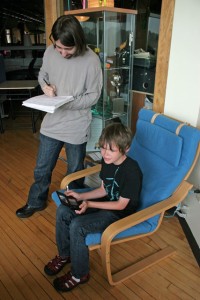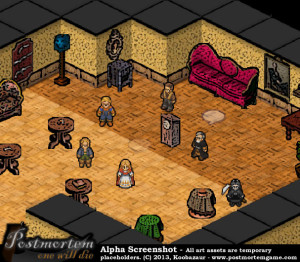I finally let someone else play my in-development Postmortem game, as I set next to them silently, grabbed a notepad, and watched. After an hour and two pages of notes, I learned a lot not just about my game, but game design itself!
The guidelines

Here’s the few rules I set for myself, and highly recommend:
- Get a “live” tester you can sit next to and observe – you will notice way more than an online tester will remember on their feedback form
- Casual or non-gamer testers are best – as gamers and designers we take many things for granted that may not actually be obvious to others
- Do NOT say a word, do not answer questions – after all, when gamers play it, they won’t have a developer over the shoulder to explain things
- Take as many notes as you can – even a twitch of their head can be an indication that something is confusing
- Have a list of questions ready after the playthrough – more meaningful than a simple “did you like it?”
Most important lessons

The most important thing I’ve discovered was that a few of my control/UI/flow design decisions were confusing and could lead gamers to missing important content. For example, my friend did not initially realize she could talk to characters multiple times to uncover new dialogue options (after exploring the world). Secondly, after speaking to all characters, she had a hard time remembering who is who or what their stance was, since all the characters reused the same temporary graphic. Lastly, there was a point where my friend literally sat staring at the screen not knowing how to progress since I did not make it clear you had to press Space to continue.
All of these are potentially game-breaking design problems that absolutely have to be fixed. Some less important things were the controls. Since I am used to my own design, I didn’t realize how uncomfortable or even counter-intuitive they can sometimes be – why doesn’t Escape exit the currently viewed item? Why can’t numpad be used to select numerical options? These were not crucial issues, but making those few tweaks made the flow much smoother.
And of course, the playthrough revelead many bugs and typos as well. I also asked several questions at the end that helped me find out which gameplay elements were most and least engaging, or which characters were boring and could use some reworking.
Looking at the gamer’s mind
Technical and design issues aside, watching my friend play and react taught me a lot about the psychology of the gamer. For example, my friend at one point asked if the choice was the “right” one, and explained she made her decisions because she thought they would make her “win” the game. It made me realize just how ingrained and natural a “we play games to win” mindset is, and that it’s actually the designer’s responsibility to dispel that in a narrative game that isn’t necessarily about winning.
My tester further assumed the a certain problematic aspect of my background world was the main focus and the way to win the game was to “fix it.” While I won’t comment on how true that may or may not be (no spoilers!), it was surprising to see her make that mental leap and base all her decisions around it.
It was also fun to see how she explored the game space, hugging the walls looking for interactable objects and “clearing” everything she could in a single room before moving onto the next. Granted, I tend to do the same in exploratory games, but you never quite think about it the same way after you see someone do that in your own game!
And a bit of inspiration

Playtesting isn’t just about finding bugs, design problems, and what you did wrong – it’s also about finding what you did right, and getting some (much deserved) pat on the back. My friend struggling to make a moral choice I wanted to be difficult, the few giggles I got out of some of my more sarcastic tongue-in-cheek dialogue options, and her being late to her next appointment because she lost track of time definitely put a big smile on my face!
So to top it off, here are two more inspirational quotes from the playthrough which filled me with confidence that Postmortem is shaping up to be a solid game:
- “Did you create this whole game world yourself? Wow!”
- “It makes you think!”